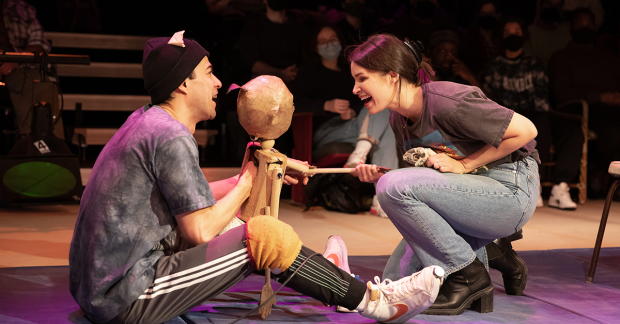Review: Finding the Humanity in a Seemingly Inhumane Situation in Wolf Play
Hansol Jung’s play, as playful and stirring as ever, returns to New York after its hit run at Soho Rep last year.

(© Julieta Cervantes)
In the lobby of the MCC Theater after every performance of Wolf Play, there are three informational boards set up offering real-world context for the unconventional adoption Hansol Jung chronicles in his play. Among the factoids displayed on those boards are statistics about the number of states that still outlaw LGBTQ couples from adopting children and the high costs of more conventional methods of parenthood (like surrogacy and in vitro fertilization), thus suggesting reasons why certain couples might resort to underground methods.
Such boards were not, from what I recall, present after performances of Wolf Play at Soho Rep last year during its much-lauded New York premiere run. Not that Jung's play needs such information to strengthen what was already an impactful family drama. But if anything, seeing the information on those boards afterward enhances one's admiration of Jung's achievement. Wolf Play may touch upon hot-button issues, but it does so in ways that are both formally playful and emotionally stirring.
The act that kicks off the play's interpersonal complications seems appalling on its face. Peter (Christopher Bannow) — who, along with his (unseen) wife Katie, had adopted a Korean boy named Jeenu before having a daughter of their own — has decided that he can no longer handle taking care of him. Instead of going through standard adoption channels, however, he puts up a posting for him on Yahoo — which Robin (Nicole Villamil), an aspiring mother, sees and decides to answer, even without the permission of her partner, Ash (Esco Jouléy).
Robin's decision inevitably causes ripple effects among the people around her, though in unexpected ways. Jeenu, for instance, opens up more toward Ash than to Robin. That's troublesome for Ash because it awakens parental feelings in them that clash with their desire to make it big as a professional boxer, one being trained by Robin's brother, Ryan (Brian Quijada). As for Peter, he comes to regret his decision, a case of seller's remorse that will lead to even more challenges when he decides to finally act on those feelings.
Then there is Jeenu himself. As Jung has written him, Jeenu is a quiet, volatile child who has weathered the trauma of parental neglect by imagining himself as a lone wolf seeking out his pack. Jung's most inventive playwriting flourish lies in depicting Jeenu not in strictly naturalistic terms, but as a puppet,designed by Amanda Villalobos and operated by a performer (Mitchell Winter, reprising his role from the Soho Rep run) who also doubles as a narrator, offering facts about wolf behavior that to some degree explain the child's own.
Jeenu's depiction as a wooden marionette has a certain poignancy, especially considering that the fraught emotions his mere presence dredges up in the adults around him threaten to blind them to the confused boy at the center. Jung, however, also pushes the conceit to meta-theatrical levels, occasionally punctuating the play with fourth-wall-breaking asides in which Winter breaks character and meditates on identity, truth, and theatrical illusion. Director Dustin Wills runs with this stylistic and thematic thread in his agile and resourceful production, infusing Wolf Play with a strikingly lo-fi quality, with Patricia Marjorie's prop design, Barbara Samuels's lighting design, and Kate Marvin's detailed sound design in particular put to noteworthy uses on scenic designer You-Shin Chen's packed traverse-stage set in suggesting a variety of settings.
As exhilarating as the production's innovative theatricality is as spectacle, even after two viewings I'm still not convinced that the meta-theatrical touches add much value to Jung's story beyond perhaps a blanket justification for its central troubled-child-as-lone-wolf metaphor. Plus, the metaphor itself requires us to believe that this six-year-old boy is precocious enough to be as well-versed in wolf behavior as the narration suggests. That can be tough to swallow whole.
Such flaws of overreaching ambition, however, are not enough to detract from the devastating punch of the whole, especially with performances as powerful as these. In addition to Winter, Villamil and Jouléy also reprise their roles from last year's Soho Rep production, and their achingly complex performances have remained intact.. As Ryan, Quijada nimbly exudes both alpha-male energy and a tough inner sensitivity. Only the rather mannered Bannow slightly disappoints as Peter compared with Aubie Merrylees at Soho Rep, the latter of whom seemed to have a stronger handle on his character's somewhat pathetic self-delusion. At least, though, Bannow never turns the flawed Peter into a caricature. Such sensitivity is in keeping with a play that, at its best, remains remarkable in its refusal to sacrifice humanity for polemics.









